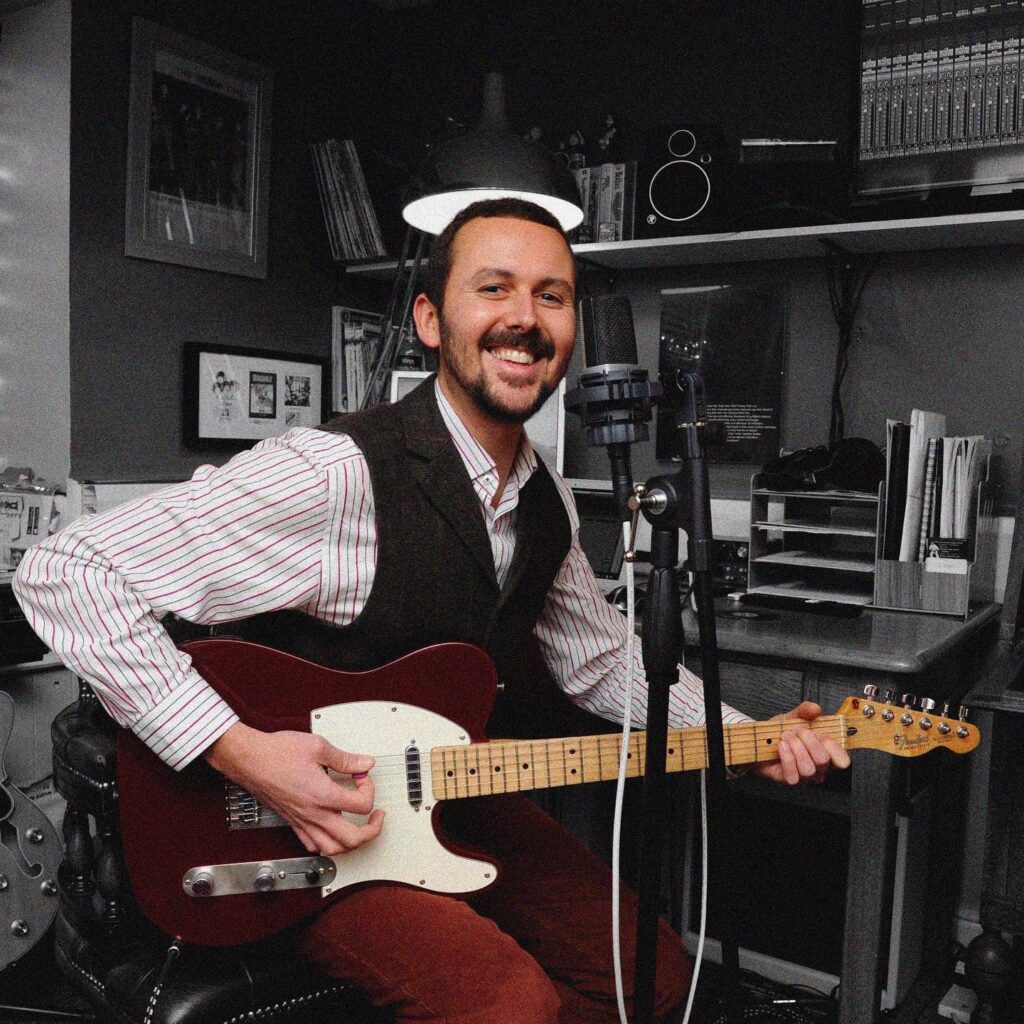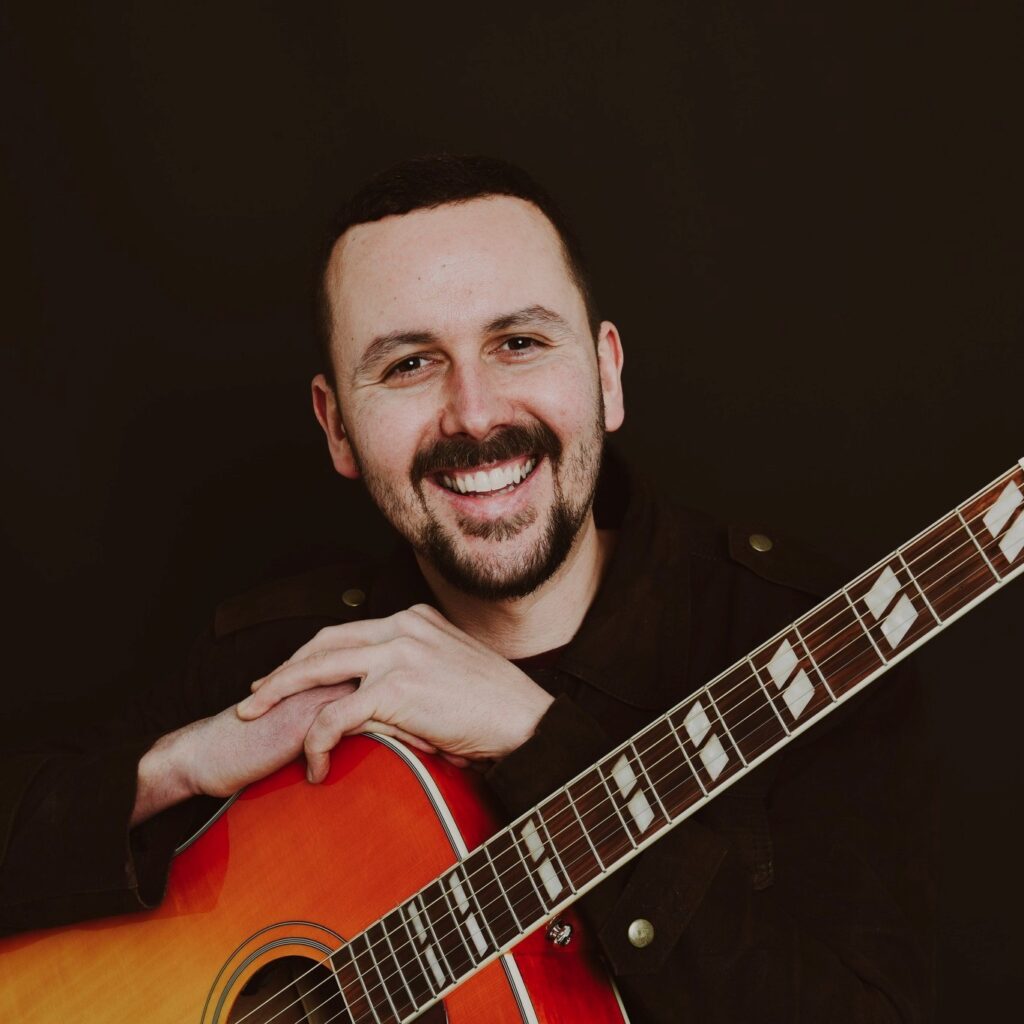Martyn Scott is a singer songwriter whose vintage indie, influenced by 60s pop, jazz guitar greats and romantic classical composers, is a technicolour combination of painstakingly written tunes, sophisticated guitar work and lush, thoughtful accompaniment.
His latest tune Lazy Days And Lullabies is a long-lost relic from an alternate-universe version of the 60s where Jeff Lynne produced Lucy In The Sky With Diamonds. The whole music is brilliantly produced and flawlessly rendered as per Tinnitist. Check out the song and the exclusive interview below:

1. Can you tell us a bit about where you come from and how it all got started?
MARTYN SCOTT: I come from Rotherham, come and visit and make your own mind up, ha!!!! I’ve lived here all my life scratching around like everyone else. My passion for music got going at school at around age 15 when I took music as a GCSE option when I should have really took P.E, but I found out you had to do loads of writing in P.E believe it or not? So I took music instead. Really, really glad I made that decsion because 3 people then changed my life, my music teacher Kim Woodward and two assistants Nick Rooke and Steve Riley. Massive inspirations to me. Then came the day when Steve played me Dear Prudence from The Beatles White Album and that was it, music and songwriting from then on. Went on to play in a band, up and down the country playing rock n roll covers in workmen’s clubs which was shite but it got me money. Then I had to grow up and went to Huddersfield Uni to study music and started teaching, eventually starting my own teaching business which is my bread and butter today. All the recent music Iv been producing has come since lockdown, that’s when I got serious about my songs again and learnt how to record professionally and built a very small and humble home recording studio. I record and play all the parts of my songs myself and then the indie label (The Animal Fram) I’m working with mixes them so they sound incredible.
2. Did you have any formal training or are you self-taught?
MARTYN SCOTT: I am self taught on the instruments I play but I got deep into music theory and other genres like Classical and Jazz at Uni.
3. Who were your first and strongest musical influences and why the name ‘MARTYN SCOTT’?
MARTYN SCOTT: The 3 members of staff from my school days I mentioned before and The Beatles. Why Martyn Scott? This is a question I ask myself everyday!!!!!!
4. What do you feel are the key elements in your music that should resonate with listeners, and how would you personally describe your sound?
MARTYN SCOTT: Quality songwriting, good instrument parts, thoughtful arrangements and all delivered with spirit. My sound is predominately a guitar band sound and is a collage of some the greatest bands, musicians and songwriters over the last 50 years or so. By that I mean from the 60’s to 98ish, after that forget it !!!

5. For most artists, originality is first preceded by a phase of learning and, often, emulating others. What was this like for you? How would you describe your own development as an artist and music maker, and the transition towards your own style, which is known as ROCK?
MARTYN SCOTT:
It’s true, you write songs and they end up sounding like the bands and artist that you love and listen too, it comes through your own music and listeners pick up on it. You can hear all my influences in my music and I feel its that that becomes your sound, a mix of your favourites are rolled together. Every time I have had a review of a song, people always identify straight away that I’m a Beatles fan and it leaves me questioning why is that? I think its mostly because of the vocal harmonies and style of songwriting. And because they are amazing tracks of cause, just like The Beatles. He he!!! As far as me as an artist, I just do what I do and write what I write and everyone else can do the analysis. As long as I like my music then I know its good, because I’m cock sure of what’s good and what is not, the top 40 (cough cough)!!!
6. What’s your view on the role and function of music as political, cultural, spiritual, and/or social vehicles – and do you try and affront any of these themes in your work, or are you purely interested in music as an expression of technical artistry, personal narrative, and entertainment?
MARTYN SCOTT:
I believe music is a very powerful tool for driving and expressing political and cultural changes and positions. Look at the Punk movement in the mid 76’s when England was a toilet, millions unemployed and an angry generation of young people feeling let down. Music expressed the feelings of the time and stirred things up in the public conscious. Likewise in the 90’s with Britpop. Britain was under conservative rule and the young generation was fed up of it, in comes New Labour to change things and the bands and artists at the time provided the punch to this cultural change. “Shat on by conservatives and shovelled up by labour.” Myself, I am a bit of everything when it comes to the themes of my writing. Some are personal experiences, some have a political edge and some are just made up narratives. The music is important to me, it has to be a meaningful delivery of good musical standard and be interesting to listen to, not passive, you have to listen!
7. Do you feel that your music is giving you back just as much fulfillment as the amount of work you are putting into it or are you expecting something more, or different in the future?
MARTYN SCOTT:
It gives me something back while I am writing and recording it, it makes me buzz, and when I hear the finished mix of a next release that really gives me a massive sense of satisfaction. But I want more of course. I want others to say they like my stuff and want to her more, because believe me I have got so much more to get out there!!
8. Could you describe your creative processes? How do usually start, and go about shaping ideas into a completed song? Do you usually start with a tune, a beat, or a narrative in your head? And do you collaborate with others in this process?
MARTYN SCOTT:
I sometimes have an idea for a theme but I most just grab my guitar start coming up with a chord sequence, sing some random crap over the top until I have a melody and then work from there to get the rest of the structure, the lyrical content and develop the ideas as I go along. As for the parts like guitar riffs, solos, other instrument parts, I actually write those as I’m recording them. I get the drums done first then get the acoustic guitar done so that’s the bones of the track, and start adding everything else over the top coming up with ideas as I go along. Sounds daft but it’s true. I collaborate with no one, I’ve got no friends. Ha !
9. What has been the most difficult thing you’ve had to endure in your life or music career so far?
MARTYN SCOTT: Looking at Sam Smith’s latest Tik Tok video of him dancing wearing a string. I ask you???
10. On the contrary, what would you consider a successful, proud or significant point in your life or music career so far?
MARTYN SCOTT: This journey I am on with the indie label I’m working with, can’t thank the guys from The Animal Farm enough. This is definitely the most structured and focused I have every been with my music. The songs and the passion have always been there, but the structure not so. I am very proud of the fact that I record everything myself, I taught myself how to record to a professional standard during lockdown so yeh, I am very proud its only me you hear on my tracks, all the vocals, instruments, everything. Then the blokes at The Farm mix it to another level.
11. With social media having a heavy impact on our lives and the music business in general, how do you handle criticism, haters, and/or naysayers in general? Is it something you pay attention to, or simply ignore?
MARTYN SCOTT: I go and cry in a corner. (NOT)
12. Creative work in a studio or home environment, or interaction with a live audience? Which of these two options excites you most, and why?
MARTYN SCOTT: Me at home, everyone in bed, in my studio, cracking on with yet another amazing track.
13. Do you think is it important for fans of your music to understand the real story and message driving each of your songs, or do you think everyone should be free to interpret your songs in their own personal way?
MARTYN SCOTT: A bit of both I suppose.
KEEP IN TOUCH:
FACEBOOK | INSTAGRAM | SPOTIFY | WEBSITE | YOUTUBE


